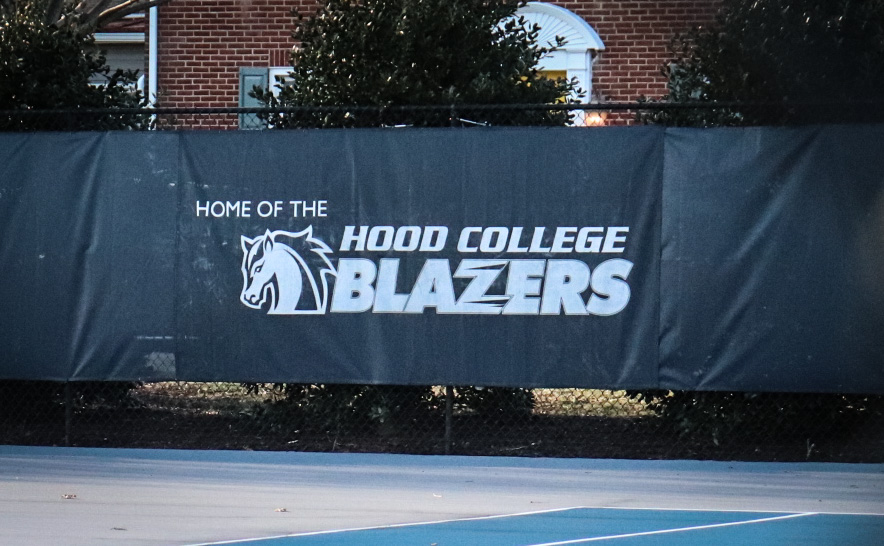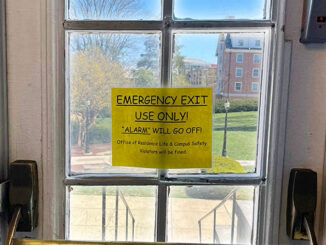By Jaasmin Foote
Hood College celebrated its 4th annual Food Day on Monday evening at 6:30 p.m. in Whitaker Commons.
Food Day is a national event that Healthy You Initiative brought to Hood faculty four years ago to provide public access to healthy and sustainable food. After a successful event, the group decided to extend their invitation to Hood students and the community in order to promote a healthy spirituality, physicality, emotionality, and mentality in the attendees.
The first year, Carol Wuenschel, the executive director of Human Resources, asked Aramark to prepare food for the event. By the third year, she had partnered with April Boulton, director of Development Biology, whom shared her passion for the environment and healthy lifestyles.
Boulton said that food plays a big role in the environment: “We sit down three or more times a day at the table, but we don’t think about where the food comes from and how much we throw out. I think it’s important to firstly acknowledge that there is a problem. The next step is to educate the students about the problem— knowledge is power. The third step is to give them solutions so they can reduce their waste.”
The theme for Food Day this year is food waste. Boulton said one of her main concerns was the amount of food waste in Coblentz. “The dining hall wastes about 1/3 of its food due to students “piling up their plates with food because they don’t want to keep getting up to get more. The food isn’t going anywhere. We waste so much food that way.”
After dinner, Georgette Jones Ph.D., and Michael Coon, assistant professor in the Department of Economics and Business Administration, gave lectures about how food waste affects your body and the environment. HEAT and Enactus also gave brief overviews of their missions and activities: HEAT’S current goal is to combat food waste in Coblentz, and Enactus is working to get compost bins installed on campus.
Jones noted during her lecture that the portion sizes in the U.S. are “out of control.” She noted that all of portion sizes have doubled or tripled since 1994. Jones said that “reducing food waste starts with you.” According to Jones, food waste is the largest portion of landfill material. She said food waste makes up 21 percent of landfill material and Americans throw out $36 million tons of food. She explained this is bad for the environment because food waste inside landfills create methane, which is over 20 times more potent that carbon dioxide.
Jones said in order to prevent food waste, people must “repurpose unwanted edible foods, promote the use of biofuels, and compost.”
She told the audience: “Don’t eat from a container or a bag, and use smaller plates. If you take less, then you eat less and waste less. You should eat slower and avoid foods rich in high fructose corn syrup to curb your hunger.”
Laura Shriver, Vice President of HEAT, said she’d like to see “this student-run effort impact Hood for the long term and get everyone into the new habit of taking less and wasting less in the dining hall.” She said that Food Day is important because “we know that our culture can be wasteful with our resources— especially food.” She added: “There are blatant inequalities with the dispersion of food and resources, yet we tend to be careless about throwing away excess food.”
During his lecture, Coon spoke about the wasteful habits of Americans: “Less waste equals less waist,” he said. “You can go to a buffet and pay a small fare to stuff your face, but people around the world are starving. That proves there is an abundance of food— we waste $165 billion worth of food a year. The rest of the world is going hungry because we’re wasting so much.”
Coon also said that American’s “preferences” are another source of waste: “Studies show that we prefer food in larger piles, but it’s beneficial to use small piles because the food is handled less by other shoppers and it has sat on the shelf a shorter period of time. The stores use nudging for evil with their randomly organized displays. They’re saying ‘Hey, you came here for cream of mushroom soup, but you probably would like cream of chicken too, so you should go ahead and buy it.’”
Lucy Hurlbut, a freshman at Hood, said she enjoyed the seminar and the menu: “They know how to feed me,” she said. “I loved the butternut squash. I also enjoyed how Professor Jones compared modern food proportions to the proportions 20 years ago. ”




Be the first to comment